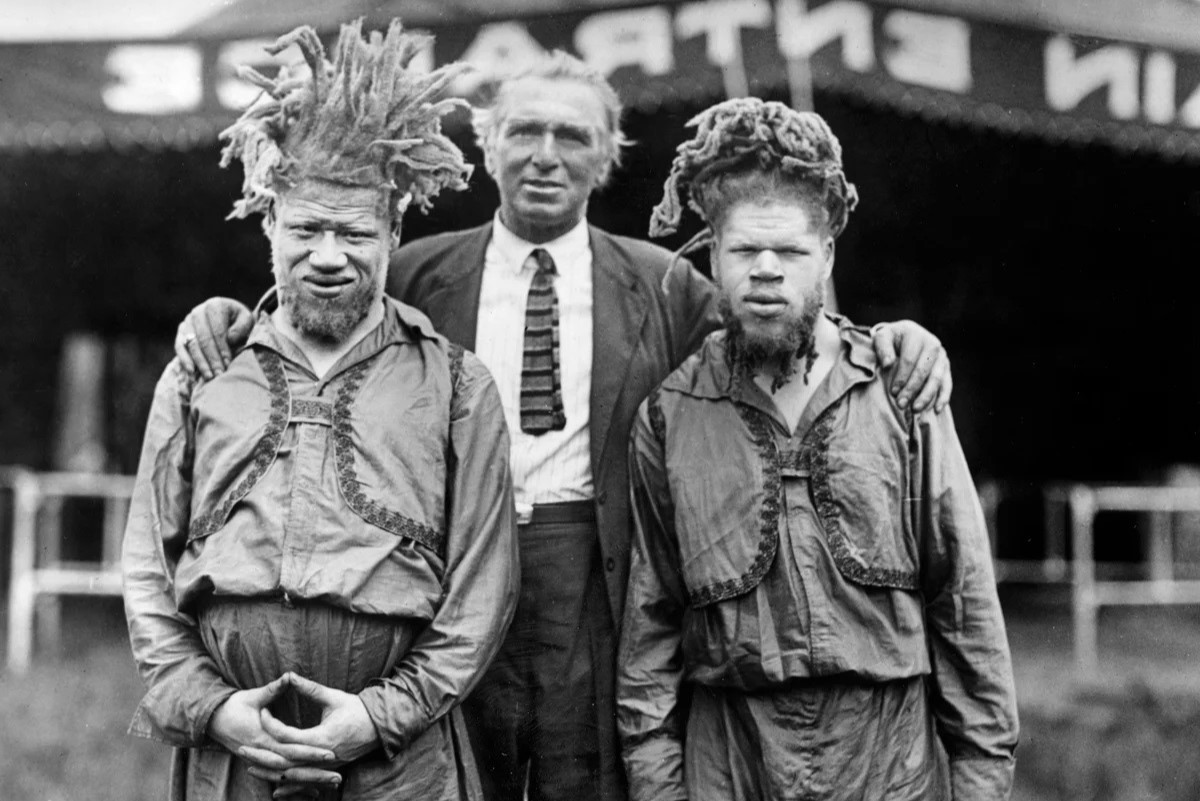
Who were George and Willie Muse? George and Willie Muse were two African American brothers born with albinism in Truevine, Virginia. Their unique appearance caught the attention of a circus promoter, leading to their abduction and exploitation in the early 1900s. Forced to perform under degrading conditions, they were billed as "Eko and Iko" and marketed with outrageous claims. Despite the hardships, their musical talents shone through. After years of separation, their mother, Harriet Muse, courageously fought for their freedom. Their story is a powerful reminder of the resilience needed to overcome racism and exploitation during the Jim Crow era.
Key Takeaways:
- The story of George and Willie Muse, known as the "Muse Brothers," is a powerful reminder of resilience and the fight for justice in the face of exploitation and adversity.
- Despite facing exploitation and hardship, the Muse brothers' musical talents and their mother's courage left a lasting impact on American history, showcasing the strength and dignity of the human spirit.
The Early Life of George and Willie Muse
George and Willie Muse's story begins in Truevine, Virginia, a small community on the edge of Roanoke. Their lives were marked by hardship from the start.
- Birth and Early Life: George and Willie Muse were born into an impoverished, sharecropping family in Truevine, Virginia.
- Albinism: Both brothers were born with albinism, a genetic disorder characterized by a lack of pigmentation.
- Health Issues: Albinism led to nystagmus, a condition that weakens vision and causes sensitivity to light.
- Sharecropping: The Muse family eked out a bare living from sharecropping tobacco.
- Racial Violence: The neighborhood was always on the edge of another attack by lynch mobs, which frequently targeted Black men.
Discovery and Abduction
The brothers' lives took a dramatic turn when they were discovered by a circus promoter. This marked the beginning of their years of exploitation.
- Discovery by Circus Promoter: It is unclear how George and Willie came to the attention of circus promoter James Herman “Candy” Shelton.
- Abduction: The popular story is that the brothers were out in the fields one day in 1899 when Shelton lured them with candy and kidnapped them.
- Notice in Billboard Magazine: In 1949, a notice allegedly credited to Harriet Muse was found in Billboard magazine, alerting others that her boys were stolen.
- Harriet’s Quest for Help: Harriet Muse went to the Humane Society and law enforcement for help but realized that assistance was scarce.
Life in the Circus
George and Willie Muse were forced into a life of performance, often under harsh and degrading conditions.
- Life in the Circus: Willie and George were exhibited as young as ten years old and were told the incredibly traumatizing lie that their mother was dead.
- Exploitation: The condition under which they worked, and their forced performing and bondage, has been equated to circus slavery.
- Dreadlocks: To accentuate their unusual appearance, their handler had the brothers grow out their hair into long white dreadlocks.
- Touring with Different Circuses: The Muse brothers were sold and stolen from showman to showman, much like Millie-Christine McCoy.
- Performance Acts: They were initially billed as “Eco and Iko, the Ambassadors from Mars.”
Musical Talents and Legal Battles
Despite their exploitation, the Muse brothers showcased their musical talents and fought for their rights.
- Musical Talents: Despite their exploitation, the brothers were talented musicians.
- Legal Battles: In the mid-1920s, the Muse brothers toured with Ringling Bros. and Barnum & Bailey Circus.
- Reunion with Mother: Harriet Muse’s determination led to a poignant reunion with her sons.
- Confrontation with Shelton: When Shelton noticed that his performers had stopped performing, he confronted Harriet and the Muse Brothers.
- Legal Proceedings: The Muse brothers filed a lawsuit for the wages they earned but were never paid.
Return to Show Business and International Tours
After their legal battles, the Muse brothers returned to show business under better conditions and even toured internationally.
- Return to Show Business: The brothers returned to show business in 1928, playing Madison Square Garden.
- International Tours: In the 1930s, they toured Europe, Asia, and Australia.
- Career End: The brothers finally ended their career in 1961 with the Clyde Beatty Circus.
Personal Lives and Legacy
The Muse brothers' personal lives and legacy continue to resonate as a powerful narrative of resilience and justice.
- Personal Lives: Neither brother married, though they were well known for their many extravagant courtships.
- Legacy: The Muse brothers’ story resonates as a poignant reminder of America’s troubled past with racism and exploitation.
- Beth Macy’s Book: Journalist Beth Macy chronicled the Muse brothers’ journey in her book.
- Civil Rights Impact: Despite being exploited, the Muse brothers unintentionally played a role in civil rights.
- Historical Context: The backdrop of the circus’s arrival in Roanoke was set against a region deeply entrenched in racial segregation.
Sideshow Performers and Exploitation
The Muse brothers were not typical sideshow acts. Their unique presentation set them apart, but they still faced harsh exploitation.
- Sideshow Performers: The Muse brothers were musicians who presented themselves in elaborate attire.
- Exploitation by Sideshow Industry: The sideshow industry exploited performers like the Muse brothers.
- Eugenics Movement: The Muse brothers unwittingly participated in the eugenics movement.
Mother's Courage and Legal Justice
Harriet Muse's courage and the legal justice the brothers eventually received are testaments to their resilience.
- Mother’s Courage: Harriet Muse’s courage in standing up to uniformed officers and fighting for her sons is a testament to the strength and determination of Black mothers.
- Reunion as a Turning Point: The reunion with their mother marked a turning point in the lives of George and Willie Muse.
- Legal Justice: The Muse brothers eventually received some form of legal justice, though it was limited.
Public Recognition and Cultural Impact
Despite their tragic beginning, the Muse brothers gained public recognition and left a significant cultural impact.
- Public Recognition: Despite their tragic beginning, the Muse brothers gained public recognition for their talents and resilience.
- Merchandise Sales: The new contract allowed them to sell their own merchandise and keep all the profits for themselves.
- International Performances: Their international tours took them to various parts of the world, where they performed for royals and dignitaries.
Historical Significance and Resilience
The Muse brothers' story is a significant part of American history, highlighting their resilience and the ongoing struggles for justice.
- Cultural Impact: The Muse brothers’ story has a significant cultural impact.
- Historical Significance: The Muse brothers’ story is a significant part of American history.
- Resilience and Dignity: Despite facing unimaginable hardships, the Muse brothers maintained their dignity and resilience.
- Legacy in Modern Times: In modern times, the Muse brothers’ story continues to resonate.
A Legacy of Resilience and Triumph
George and Willie Muse's story is a powerful reminder of the resilience and strength needed to overcome adversity. Born into poverty and exploited for their albinism, the brothers faced unimaginable hardships. Yet, they never lost their spirit. Their mother, Harriet, fought tirelessly to reunite with her sons, showcasing the unbreakable bond of family. Despite years of exploitation, the Muse brothers eventually found freedom and recognition for their talents. Their journey from circus sideshows to international stages highlights the complexities of racism and exploitation in America's past. Their legacy continues to inspire, urging us to reflect on the ongoing struggles for justice and equality. George and Willie Muse's tale is not just a story of hardship but one of triumph, resilience, and the enduring power of family.
Frequently Asked Questions
Was this page helpful?
Our commitment to delivering trustworthy and engaging content is at the heart of what we do. Each fact on our site is contributed by real users like you, bringing a wealth of diverse insights and information. To ensure the highest standards of accuracy and reliability, our dedicated editors meticulously review each submission. This process guarantees that the facts we share are not only fascinating but also credible. Trust in our commitment to quality and authenticity as you explore and learn with us.


